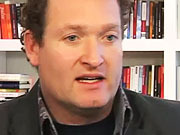Postma: The role of ICT in Africa
Watched 774 times
Video description
On the one hand we see, for example, a lot of sustainable energy being implemented in Africa. So only 18 per cent of the people in Africa have access to electricity, while the continent itself harvests enough energy to service the whole world. Whether it's bio-mass, geothermic, solar, wind, so there is a lot of energy on the continent. It just can't be transformed to power yet. That demands a tremendous investment. But, for example, when mobiles are being rolled out into rural areas, you have these big antennas being placed out in the desert, and they usually use a diesel generator. Diesel is expensive, people need to drive out into the rural areas filling up the generators, that's not very efficient, and the diesel gets stolen, of course. So what you see in the roll out, for example, of mobile telephony is that more and more of these antennas are being placed and they are totally serviced by, for example, solar power and wind power. So on one thing I think the continent is leapfrogging into, for example, sustainable technologies. Another one is, for example, Wi-MAX. Wi-MAX is the successor of Wi-Fi for very long distances. In Europe it's very difficult because it tends to interfere with emergency frequencies, television and radio. But since Africa is very greenfield in that Wi-MAX finds a more easy ground of adoption and roll out than in the west for example. So there is definitely an Africa which leapfrogs into these new kinds of technology. But on the other hand they just also need to be connected to the western economy in the western societies. So what you see, the reason why Africa is such a black hole in this satellite map by night is that there's no wiring in or around Africa. So a few of the northern countries make use of a Mediterranean pipeline, which is on the bottom of the sea, mostly connecting Europe to the Middle-East. But as we speak there are three enormous boats floating around Africa, preparing a full circle wiring across the continent. So there are three, what you call, transatlantic pipelines or submarine cablings being laid out across the continent. And this is a tremendous breakthrough for Africa, because it will mean that from, I think, eight countries right now about 32 of the 54 countries will have direct access to the big fat pipe which is connecting the rest of the world. This is a Pan-African initiative, meaning that the other countries which are landlocked - they have no access to sea - have made agreements and also invest in this cabling. So we could say that by 2010 the whole continent of Africa has direct access to the global network. And I think that is a tremendous breakthrough. And there's a very natural deadline behind this. And that's the World Championships of Soccer, which is like what the Olympics were for China, but then it's now the World Championships of Soccer for Africa. Because there is a lot of news and images which need to be transmitted to the rest of the world and it's going to be their show case. So I think there's a very natural deadline for this infrastructure to be ready by 2010. If you make a phone call now from South Africa to Namibia, for example, it's connected all the way via New York or London or, for example, Paris, which is costing a lot of money, which is very bad quality. You now see an infrastructure emerging where you have direct access between the countries on the continent and also the first African satellite has been launched very recently. So up till now they just had a satellite scheme like: between 9 and 9.10 we could use that French satellite, and from 9.30 till 10.30 we could use the American satellite. Because none of the satellites was really focused on the continent. So they used a little of the waste bandwidth. But now they have their own Rascom African satellite which will help to boost the Pan-African communication, lower the costs and provide access to the rural areas. I think that is important, because in Africa we have this modern sector and this informal, traditional sector, and that's where the real economic growth needs to take place. And that's what's interesting about mobile telephony, for example, and mobiles which is the big roll out of ICT as we speak. It's not just for the city, but mobile telephony helps farmers, rural areas to grow and their economic potential.
Category:
Top Free Online Videos tagged Tech
Added on
08 Apr 2017
Comments

